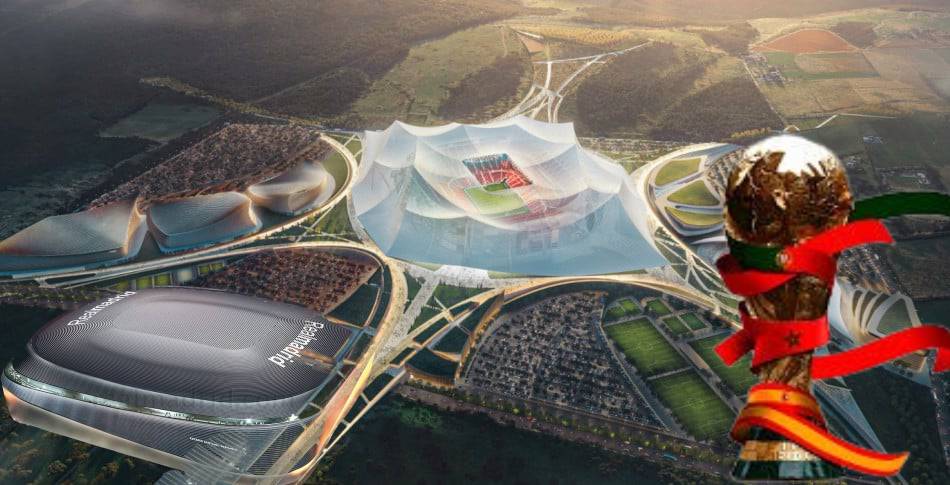In a surprising twist, Barcelona’s sports councilor, David Escudé, has revealed that Real Madrid’s famed Santiago Bernabéu stadium is ineligible to host the final of the FIFA World Cup 2030. According to a report by Catalunya Ràdio and later shared by Marca, the Bernabéu does not meet FIFA’s strict criteria for hosting such a prestigious event. This announcement shifts the spotlight onto the Spotify Camp Nou in Barcelona and the under-construction Stade Hassan II in Morocco, both of which are still in the running.
Escudé highlighted that FIFA’s requirements for the stadium capacity are a major stumbling block for the Bernabéu. While the Bernabéu is one of the most iconic football arenas in Europe, its seating capacity falls short when compared to the two other contenders. The Camp Nou and Stade Hassan II both boast larger capacities, giving them the edge for hosting what will be a historic World Cup final.
This revelation has left many questioning whether European stadiums are falling behind global competitors in meeting FIFA’s increasingly stringent standards. The final decision, Escudé emphasized, may ultimately come down to the size and infrastructure of these venues, as well as the commitment of the hosting countries.
Morocco’s ambitious play for World Cup glory
Morocco’s ambitious plans to host the World Cup final are taking shape with the construction of the Stade Hassan II in Benslimane, located just outside Casablanca. Set to accommodate a staggering 115,000 spectators, this stadium is poised to become one of the largest and most advanced in the world. The project is part of Morocco’s broader push to solidify its place as a top destination for international sporting events.
Strategically located near key highways and an international airport, the Stade Hassan II will not only offer state-of-the-art facilities but also seamless access for visitors. The stadium will feature cutting-edge technology, luxurious VIP areas, and ample entertainment and dining options, making it a hub for both sports and culture. The modern design blends aesthetic appeal with functionality, ensuring a top-tier experience for fans from around the world.
Morocco’s investment in this world-class stadium signals the nation’s serious intent to compete on the global stage, positioning the Stade Hassan II as a strong contender to host the 2030 World Cup final. With a solid plan in place and growing international support, the stadium’s completion will mark a significant milestone in the country’s sporting journey.
The Bernabéu’s missed opportunity
For Spain, the exclusion of the Santiago Bernabéu from the World Cup final race is a tough pill to swallow. Despite Real Madrid’s legendary status in the football world and the stadium’s recent renovations, it simply doesn’t meet the requirements necessary to host an event of this magnitude. FIFA’s decision underscores the evolving standards for sports venues, where capacity, technology, and infrastructure all play a crucial role.
Just a few years ago, many speculated that the Bernabéu would be the obvious choice for the 2030 final. The stadium has a rich history, having hosted numerous significant matches over the years. However, as the global competition heats up, it’s clear that newer, larger, and more advanced venues are setting the standard.
While the final venue remains undecided, the race between Barcelona’s Camp Nou and Morocco’s Stade Hassan II is bound to intensify as both countries make their final bids. With modern infrastructure and high spectator capacities at the forefront, the stakes have never been higher in the quest to host one of the biggest events in world sports.
The road ahead
As FIFA evaluates potential venues for the 2030 World Cup final, the decision will reflect not only on the stadiums but also on the countries’ broader commitments to the sport. Spain and Morocco are both eager to make history, and with Morocco’s investment in cutting-edge sports infrastructure, the competition is fierce.
The exclusion of the Bernabéu signals a turning point, where traditional football powerhouses must adapt to the demands of a globalized and highly competitive sports landscape. Spain’s hopes now rest on the Camp Nou, while Morocco’s rise as a sporting giant continues to gain momentum. The coming months will reveal which stadium—and which country—ultimately claims the honor of hosting the 2030 World Cup final.
As the competition heats up, the world watches closely, awaiting FIFA’s final decision.
